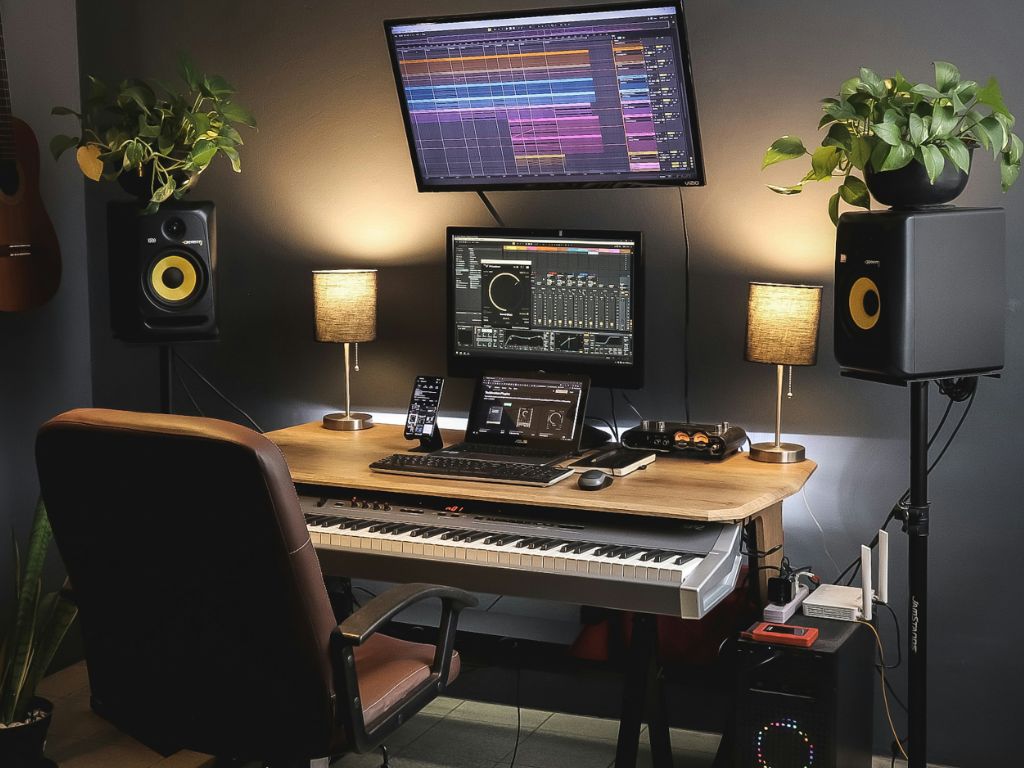Music Production First Steps
The barrier for entry in music production has been officially demolished. Learn some tips to get you started as a new music producer.

First Steps
We’ve entered a new era of music production. What once required expensive gear and access to a commercial studio can now be done from a laptop at home. If you’re looking for music producer tips, or wondering how to get started as a music producer, this guide will walk you through the essentials. These ideas will help you move from curious listener to confident creator.
But with so many tools and tutorials available, it’s easy for a music producer beginner to feel overwhelmed. The question isn’t can you start, it’s how do you focus?
That’s where structure comes in. Below are five practical steps and pieces of advice for music producers that will help you build momentum and confidence.
Don’t underestimate the power of routine
One of the most overlooked music producer tips is the importance of routine. Talent and inspiration are valuable, but discipline is what turns scattered ideas into finished tracks.
- Set aside regular time each day or week for producing, even if it’s only 30 minutes.
- Create a dedicated physical space where distractions are minimized.
- Break down your learning: one session could be dedicated to sound design, another to arranging, and another to mixing. This especially helps if you get tired of the same routine each day.
Consistency compounds. A music producer beginner who shows up regularly will improve faster than someone who only creates when inspiration strikes.
Learn the basics
If you want to know how to get started as a music producer, you need to learn the foundations. That doesn’t mean becoming a music theory professor overnight, but understanding the essentials:
- Music Theory: Involves learning about chord progressions, scales, and rhythm.
- Digital Audio Workstation (DAW): This is the software that you can create the music in. Most have steep learning curves but online resources are numerous and plenty. Check out YouTube for great tutorials.
- Core Tools: Effects such as EQ, compression, reverb, and delay are the bread and butter of music production.
Start small. Focus on one concept at a time, then apply it in a simple track. Learning by doing will help much more than endlessly watching tutorials. This is one of the best approaches to making beats for beginners and a key step when making music for beginners.
Build on Foundations
Once you’ve got the basics down, it’s time to start building on them. Think of it like learning to play a sport. You don’t start out as a pro, but every practice session makes you better. As a music producer beginner, you’ll make a lot of rough tracks at first, and that’s completely normal.
The goal here isn’t perfection, it’s progress. Try finishing simple songs, copy the structure of tracks you like, and notice what sounds good (and what doesn’t). Each attempt is a building block toward finding your own style and is solid advice for music producers who want to grow quickly.
Experiment Continually
One of the best music producer tips is to keep experimenting. Sticking to the same sounds and patterns will hold you back.
Play around with your DAW: record everyday noises, try weird effects, flip samples, or remix songs you love. Even if an idea doesn’t work out, you’ll learn something new every time. This kind of curiosity is key when making beats for beginners and helps you discover what makes your sound unique. For anyone making music for beginners, experimentation is how you find your voice.
Always Be Finishing
Finishing your tracks is always important when starting out. Each part of the process—writing, arranging, mixing, and mastering—takes a long time to learn well, and you don’t need to be amazing at all of them. But knowing the basics of each step will make you a better producer and make it way easier if you ever team up with someone else. There is a lot of value in finishing tracks. Walking through the production workflow is a process that involves many steps from composition, arrangement, mixing and mastering.
It’s good to understand what each step involves and what goes into it. Not only does this improve your skills but it also assists others if you choose to pay or find a collaborator for one or more of these steps. This is essential advice for music producers who want to grow their skills and confidence.
In Conclusion
Start small and intentional while not overwhelming yourself is trickier than it sounds. However, following some basic steps as outlined above and taking the time to learn will pay dividends and you’ll notice yourself improving incrementally. Each person takes a different amount of time but dedication and motivation go a long way.
Whether you’re making music for beginners or already a music producer beginner looking to improve, these steps are a great starting point. Dedication, patience, and consistency are the best music producer tips you can follow. Good luck, and keep creating!
